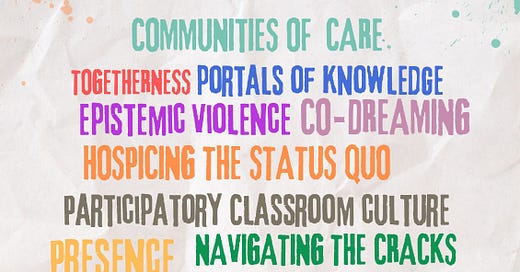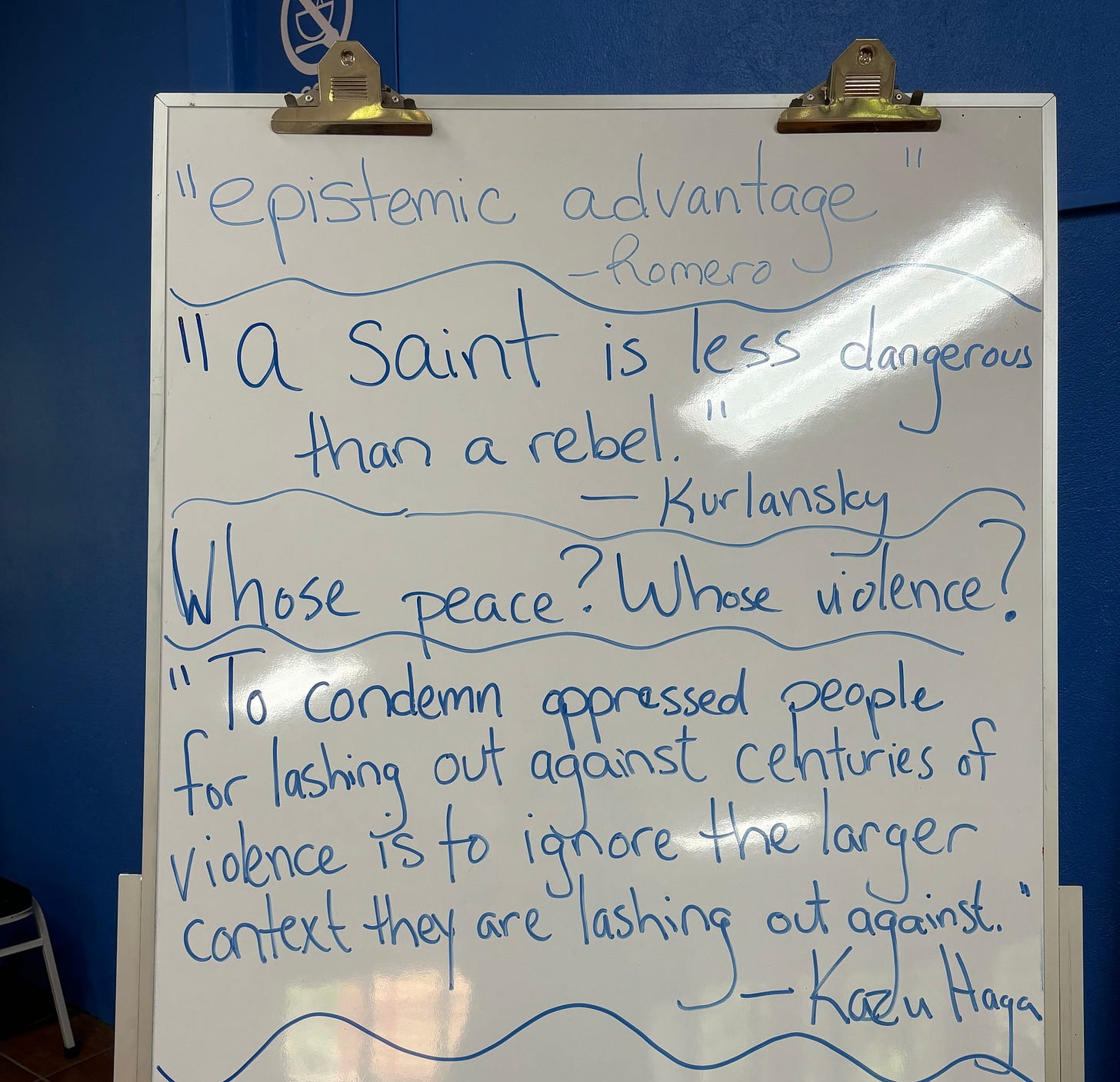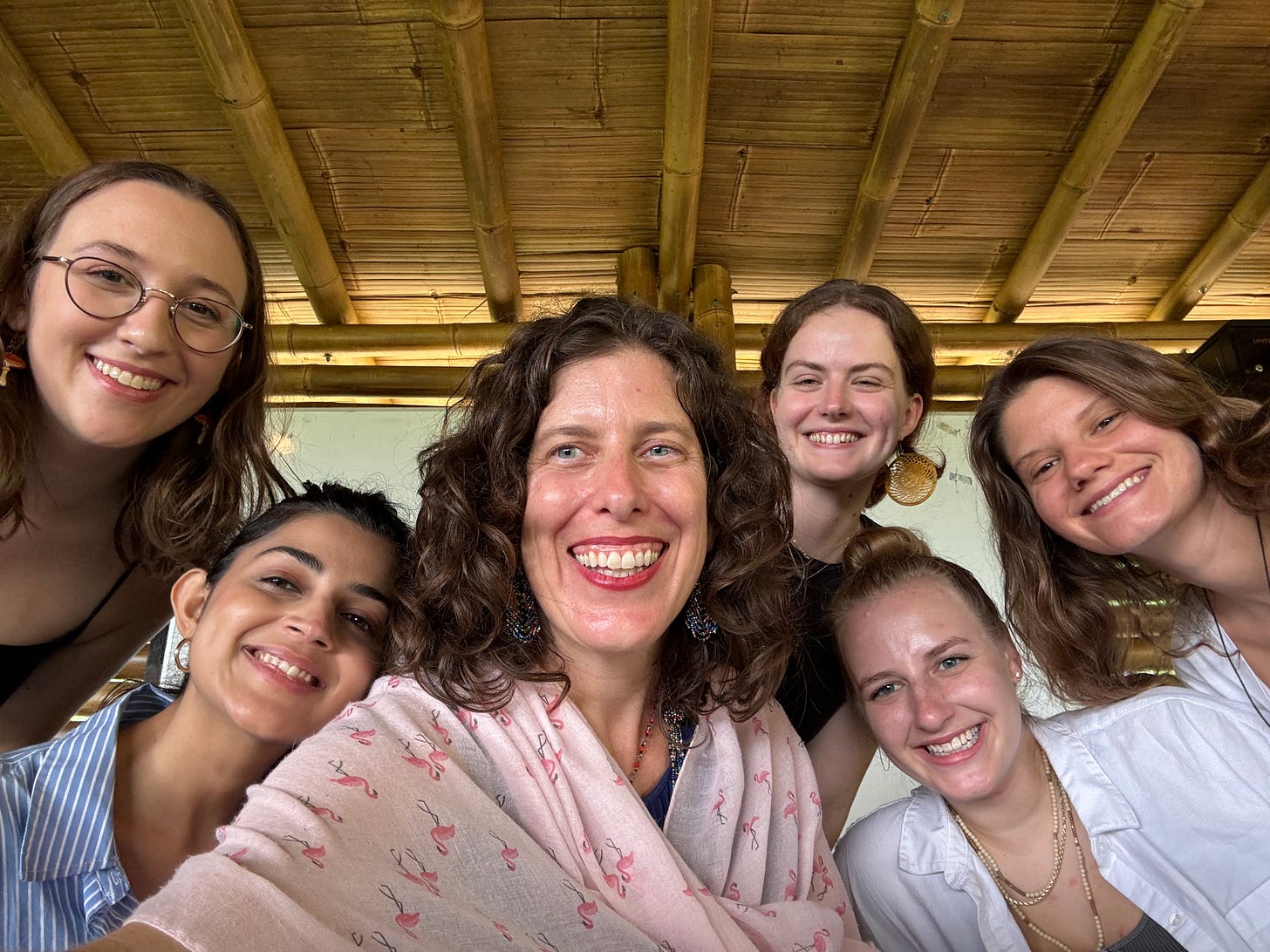We are delivering each other
Snippets from the World Dignity University Books, Dignity, & Dialogue forum
Dearly beloveds,
How are you? How is your heart? It is a heavy-hearted, heartbreaking time to be alive, and I hope you are taking good care.
What are you doing to take care these days? Today I will take a social media fast. I will meditate more. I am doing a lot of cleansing and protection practices. I will try to read some things that inspire and nourish me. I will take refuge in the toucans and the trees. I will write to my representatives and share mutual aid opportunities to be in solidarity with those directly experiencing the horrors of this ongoing genocide.
I want to share the words of Mahmoud Alshaer, a friend of Ecoversities Alliance in Gaza (who you can support by contributing here1):
“Wish us peace and don't lose hope in your ability to stop this war. Your voice is important, and I urge you to speak out and spread the word about what's happening here again and again.
-Mahmoud”
Taking care of ourselves and doing everything we can go hand in hand.
I am in the midst of my last teaching intensive of the academic year, which means most of my waking energy (and some of my sleeping) is going in that direction. As I prepared for the start of class last week, I realized it has been a full academic year of prepping classes while tears flow as I watch what is unfolding in the world - in Gaza, in Congo and other places, now the police brutality against those protesting the genocide.
In the meantime, we study nonviolence together.
More on that another time, perhaps. But for today, I wanted to share a few snippets from our event for the World Dignity University. Our peace ed beloved learning community gave our presentation on the article we wrote for the special issue on pedagogies for peace for the journal Feminist Pedagogy (forthcoming). It was such a joy. My cheeks hurt at the end of it from so much smiling.
It was a proud moment, proud of my students and of us as a learning community. It was a moment to shine and bring forth what we have created this year and share it publicly with others. It was a moment of public pedagogy and praxis, bringing our words and experiences to life. Afterward, my students commented how it felt like stepping out into the next stage of their professional lives - and it was.
I will share the recording, as well as the article, as soon as they are available, but for today, I wanted to share a few snippets.
Snippet #1: Our opening statement
We could not talk about peace education in this moment without speaking to the larger context of what is happening in the world, and the horrific violence we are witnessing (and that some are experiencing directly). Here is statement of solidarity and acknowlegement that we opened with:
We are here today to share our experiences with peace education at the University for Peace. As students and practitioners of peace education, it should be apparent but is necessary to state clearly that we oppose war and genocide. We cannot give a presentation on peace today without acknowledging the vast peacelessness in the world, and the atrocities being committed as we speak in Gaza, Sudan, the DR Congo, Haiti, and many other places. We stand in solidarity with all people who are suffering from war and violence, and all those protesting on the streets and encampments around the world demanding that our leaders stop funding and enacting war. The current student movements against war and genocide and for a free Palestine, and the violent repression and censoring by university administrations and state authorities, illustrate the important role education has to play in social change, and also illustrate how these institutions are built to uphold the status quo of a culture of war. A core tenet of peace education is that education can be oppressive or liberatory, it can uphold domination or it can transform it, and as such, it is necessary to create educational spaces oriented towards the goal of a more just, peaceful, liberated world. We sit in the tension of the awareness that our peace education efforts are not enough alone, but that united with others around the world demanding and working towards a more peaceful, just, and liberated future for all, that our actions matter. We know our words fall short, and we also know we have to use our voices and our platform to call for an end to war, occupation, and genocide.
Snippet #2: The collaborative poem-collage
We offered this statement, then read our article. The article is written in the form of each of us giving testimonials of our experiences of pedagogies for peace this year, so we took turns reading our sections, closing with healing howls (the article is entitled A Pedagogy of Howling). While we were reading, we invited the audience to share notes in the chat - words or phrases that stood out to them, stirrings, reflections, questions. After they added them to the chat, three of us went to create a poem-collage while the other three stayed to engage in Q&A. Here is the poem-collage:
Snippet #3: We are delivering each other.
We are delivering each other.
This was something I said in response to our host, my dear friend Phil Brown, who said something about how it was clear that what we did together was something very different from many classroom settings, where it looks like a teacher delivering content to students.
Yes! I replied. We are delivering each other.
In this process of peace education - for it is, more than anything, an unending process - we are delivering each other.
We are becoming together.
I am becoming with my students as they are becoming with me. We are always becoming together.
We walk this path side by side, hand in hand, arms outstretched, to carry and catch and uplift each other.
We are in a constant process of birthing new versions of ourselves, stepping towards fullness and wholeness, tending to our brokenness, together.
In birthing new versions and visions of ourselves, we are birthing new worlds, new possibilities.
Our experiences and what each one of us brings is what makes the learning real and deep. We call each other in and bring each other forth.
We are delivering each other.
To me, this is the heart of pedagogies for peace, this process of co-deliverance, collaboration, co-creation.
I leave you here today, dear reader. Please take care of yourselves and one another. We need each other more than ever.
With love and care,
Stephanie
Thank you to those who have contributed <3






